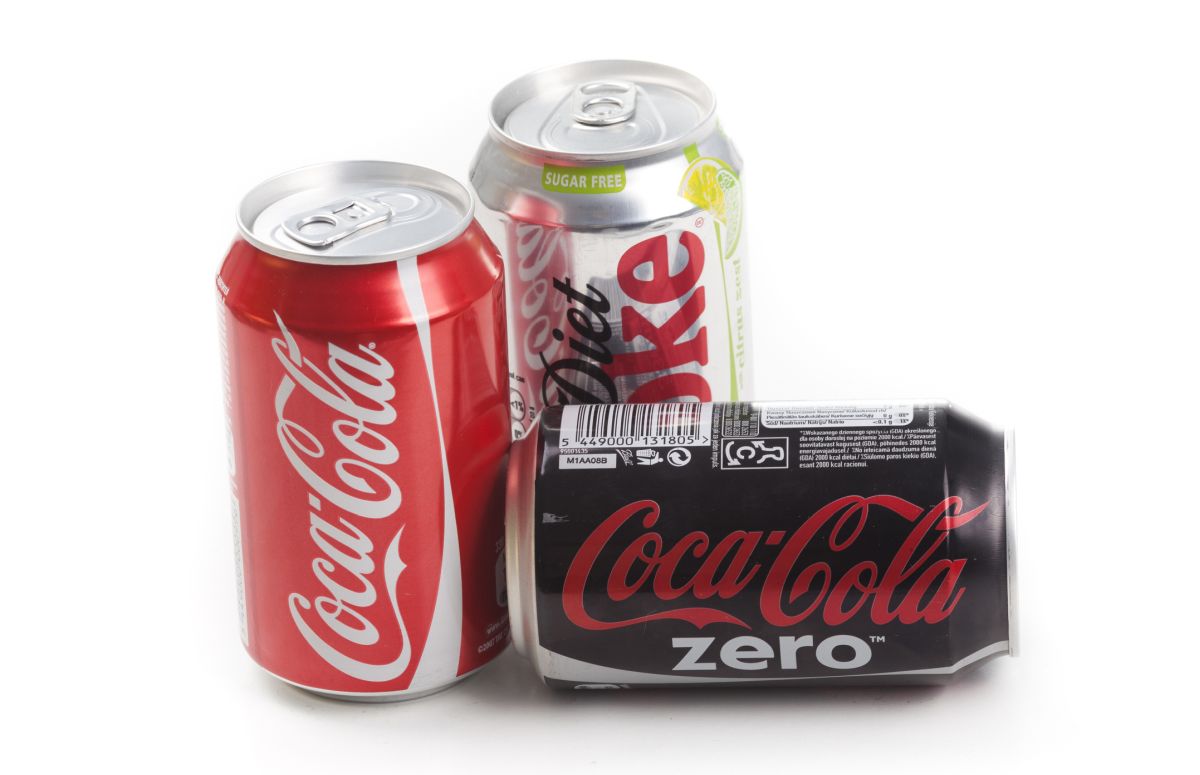When analyzing Coke Zero vs. Diet Coke, there are some slight differences. Both varieties of drink can be used by people who want to reduce their sugar intake, but neither is considered to be a healthy option.

What Is Coke Zero?
Coke Zero came out in 2006 and was replaced by Coke Zero Sugar in 2016. This beverage is considered to be a healthier version of the original Coca-Cola beverage. It has zero calories and zero sugar. Coke Zero is also made using several artificial sweeteners.
Coke Zero Ingredients
- Acesulfame potassium
- Aspartame
- Caffeine
- Caramel color
- Carbonated water
- Natural flavors
- Phosphoric acid
- Potassium benzoate
- Potassium citrate
Nutrition Facts of Coke Zero
A 12-ounce serving of Coke Zero provides:
- Calories: 0
- Total Fat: 0 grams
- Sodium: 40 milligrams
- Total carbohydrates: 0 grams
- Total sugars: 0 grams
- Protein: 0 grams
- Potassium: 60 milligrams
- Caffeine: 34 milligrams
What Is Diet Coke?
Diet Coke contains zero sugar and zero calories. It’s a good beverage choice for people who like Coke, but wish to lower their sugar intake due to diabetes or other reasons.
Ingredients in Diet Coke
- Aspartame
- Caffeine
- Caramel color
- Carbonated water
- Citric acid
- Natural flavors
- Phosphoric acid
- Potassium benzoate
Diet Coke Nutrition Facts
A 12-ounce serving of Diet Coke provides:
- Calories: 0
- Total Fat: 0 grams
- Sodium: 40 milligrams
- Total carbohydrates: 0 grams
- Total sugars: 0 grams
- Protein: 0 grams
- Caffeine: 46 milligrams
How Coke Zero And Diet Coke Are Alike
Coke Zero and Diet Coke contain no added sugar, which is one of the main selling points of both Diet Coke and Coke Zero. Both Coke options also both have a caffeine-free version, and both have a variety of flavor options people can choose from.
Both Coke Zero and Diet Coke contain an amino acid called phenylalanine.
Key Differences: Coke Zero vs. Diet Coke
History
Historically, Diet Coke can be found just about everywhere and has been around for about 4 decades. It’s considered to be Coca-Cola’s flagship sugar-free product.
The company Coca-Cola spent about two decades working on the formula before it was launched in 1982. Diet Coke came out at a time when diet culture was on the rise and there was more acceptance of dietary needs.
Coke Zero Sugar is newer to the market as it was made available to consumers in 2016 as a replacement for Coke Zero. It also became known as a sugar-free option alongside Diet Coke.
Coke Zero comes in a variety of different flavors, such as cherry, cherry vanilla, orange vanilla, and vanilla. Diet Coke also comes in a variety of flavors, such as ginger lime and feisty cherry.
Taste
When compared to Diet Coke, you might notice a slightly different aftertaste when you consume Coke Zero rather than Diet Coke. This can be attributed to the ingredient acesulfame potassium found in Coke Zero.
Ultimately, neither Coke option tastes the exact same as the original one, but Coke Zero tastes more similar to the classic Coke. Some people will also prefer one over the other based on the slight difference in taste.
Caffeine Content
The caffeine content in Coke Zero and Diet Coke is well below the daily caffeine limit that is recommended for adults. With this said, Diet Coke does have more caffeine than Coke Zero.
Types Of Sweetener
One of the main differences between Diet Coke and Coke Zero is the type of sweetener that is used. Diet Coke uses aspartame as its primary sweetening agent, whereas Coke Zero has acesulfame and aspartame as the sweetening agent.
What Is Aspartame?
Aspartame is known to be a sugar alternative. It can act as a substitute for sugar in many food and drink options. This ingredient is used in products that result in less sugar and fewer calories.
Is Aspartame Safe To Consume?
Aspartame is safe to consume and it is an ingredient that has been heavily researched all around the world. In the United States, the Food and Drug Administration has affirmed aspartame to be a safe alternative to using sugar.
Other authorities have also said that aspartame is safe to consume, such as the European Food Safety Authority (EFSA), the Joint Expert Committee on Food Additives (JECFA), and more.
Despite aspartame being safe to consume for many, if you have phenylketonuria (PKU), a rare hereditary disorder, you should limit your intake of phenylalanine. Phenylalanine is a common amino acid found in aspartame.
Since aspartame is in both Coke Zero and Diet Coke, it will indicate on cans and bottles that there is phenylalanine. You can find this information on the back of each can and a bottle of Coke Zero or Diet Coke.
Healthier Choice: Coke Zero vs. Diet Coke
There is no concrete evidence that suggests that coke zero is healthier than Diet Coke and vice versa. When you compare Coke Zero and Diet Coke, the ingredients and caffeine content are similar. In general, diet soda isn’t thought to be a healthy drink. It’s best to consume in moderation.
If you are trying to cut back on added sugar, Coke Zero or diet coke is better than the original sodas. When choosing between the two, someone might prefer one or the other based on taste since coke zero tastes more like regular coke.


Leave a Reply